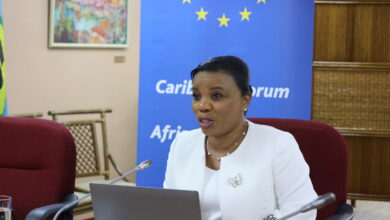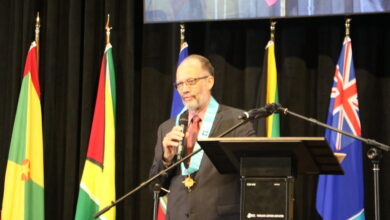Thank you for inviting me to be here with you this morning to share a few thoughts. I believe that it is the first time I have interacted with you but I am confident it will not be the last. May I congratulate you on the occasion of your 25th Anniversary and that milestone emphasises the relevance of your work.
I want to associate myself with the view of putting people at the centre of development. It has been central to my thinking since I assumed office in August 2011 and is at the heart of the reform process underway in the Community. I am willing to work with you and have more collaboration as we seek to make our integration process more relevant and practical to the people of our Community.
I thank the Caribbean Policy Development Centre (CPDC) for organising this regional Conference which, according to its theme Caribbean Civil Society Setting the 2030 Agenda: Counter Narratives and Heterodox Thinking will be seeking out-of-the-box solutions to our challenges.
These challenges are against the background of a global environment which has been in a state of flux for some time. Last week’s vote for the United Kingdom to leave the EU is one more factor in the uncertainty that prevails. We, in the Caribbean Community (CARICOM), have not yet fully recovered from the financial and economic crisis which commenced in 2008. The issue of a chronic and high debt burden continues to serve to constrain economic development and to limit resources available for investment in social transformation and development.
This debt is largely due to external factors such as the financial and economic crisis as well as to severe climatic events which destroy infrastructure, property and lives. At the same time as small, vulnerable middle-income countries we are being graduated out of concessional development financing.
The impact of climate change related events in the Region has escalated. Some of our Member States experience severe drought while others are visited by hurricanes, and others experience flooding which literally destroy their physical and economic infrastructure.
We continue to exist at the mercy of the global market place. Prices for the commodities we produce are in decline. We continue to face health-related challenges such as Zika. Our unemployment rates remain high, crime remains a concern and our vulnerable groups, including women and youth, continue to face challenges.
If the scenario which I have described seems familiar, it is because I have been describing the elements which contribute to our physical, economic and social vulnerability, as a group of small nation states and an economic integration grouping.
In more recent times, particularly in 2015, we are beginning to think that we are now being listened to by the international community. Recent global agreements and initiatives have the potential to begin to address some of our needs.
These include the SAMOA Pathway, in which SIDS vulnerabilities are clearly acknowledged and in which action to address some of these vulnerabilities are clearly identified.
It includes the 2030 Agenda and the Sustainable Development Goals. The Agenda and the Goals will both contribute to creating the space and environment in which CARICOM’s sustainable and inclusive social and economic growth and development can be addressed and approached.
These recent developments and initiatives also include agreements reached on Financing for Development (FFD), which produced the Addis Ababa Action Agenda. And last, but of equal importance, is the Paris Agreement on Climate Change which sets out the first global legally binding Climate Change Agreement.
CARICOM played a role in arriving at all of these global agreements, in particular in Paris at the Climate Change Conference. Our success in shaping that final Agreement was due in large measure to the unity of purpose and action we displayed. Civil society and the youth were an integral part of our group at those negotiations and were strong advocates of our positions. It was one of the Community’s proudest moments in the international arena and it was all possible because of the partnerships that were established.
It is crucial that the links that we forged with international non-governmental organisations who supported our positions there be maintained. Your association with such groups can benefit our continued advocacy for global temperature rise not to exceed 1.5 degrees. You can also encourage your international counterparts to lend their voices of support in other areas such as graduation of small, vulnerable middle-income countries from concessional development financing.
Colleagues, the global initiatives and agreements create the environment in which we can plan and take action on our own development. However important as they are, they are not sufficient. We must take our own action. Part of the action which we propose to take as a Caribbean Community is described in the Strategic Plan for the Caribbean Community for the period 2015-2019.
That Plan was derived through a widespread inclusive and consultative process undertaken at national and regional levels, which included civil society among the many stakeholders. After distilling all the views and ideas put forward, priorities were determined. The Plan sets out the strategies to be pursued, the outcomes anticipated, the principal measures to be undertaken and the major activities to be implemented. We are well advanced with our work on the Operational Plan.
Among the more urgent priorities are:
- Accelerating the implementation and use of the CARICOM Single Market and Economy;
- Macro-economic Stabilisation;
- Building competitiveness and Unleashing Key Economic Drivers for Transition to Growth;
- Human Capital Development;
- Health and Wellness;
- Climate Change Adaptation and Mitigation;
- Disaster Mitigation and Management;
- Foreign Policy Coordination;
- Reforming the Organs, Bodies and Governance Arrangements to enhance decision making, implementation and accountability and enforcement; and
- Developing Arrangements for Participatory Governance at the regional level.
The latter priority is probably the most important in the context of this gathering, since it seeks to involve all elements and components of Caribbean society in the regional development process. It is premised on the fact that we cannot achieve sustained and inclusive growth and development unless all the players in development are actively engaged.
It involves the creation of partnerships for development. It specifically involves formal inclusion of the Private Sector, Civil Society and Labour in the consultative process, the decision-making processes and in implementation at national and regional levels. It takes its cue from the Revised Treaty of Chaguaramas which requires us to establish and maintain an efficient system of consultations at the national and regional levels. At the level of the Secretariat, efforts will continue in our search for funding to establish a civil society desk. We are a little more advanced in respect of the Gender desk.
Implementation of the agreed Strategy will not be without its challenges. It will require changes in our thinking. It will require the adoption of new approaches to planning. It will require us to look at innovative approaches to implementation and financing. In summary, we cannot approach implementation of the Strategic Plan for our development as if it were business as usual.
The people of the Region will hold all of us accountable for the success or failure of its implementation. As a Region, we cannot afford to miss this opportunity to set ourselves on a trajectory which can boost our own development.
I believe that we have to think outside the box, look for innovative and new ways to address our challenges and to adopt new approaches to our development. While the challenges may have long been identified, it is how we approach finding and implementing the solutions which will be important in the long run. It is that kind of strategic thinking which has gone into the formulation of the Strategic Plan. We need all actors in the development process to contribute to the innovative and new approaches to our development.
From the Agenda which you have set for yourselves, I anticipate outcomes which will help to lay the basis for and advise on civil society’s further and deeper involvement in the development process in our Region.
I thank the European Union for its support geared towards enhancing the ability of civil society to make an informed input and more meaningfully participate in the regional development process.
This Conference heralds the start of a project benefitting from the 10th EDF Caribbean Regional Indicative Programme. There is no doubt that this would assist us in our attempts to engage Civil Society as we seek to involve all our stakeholders in the Community’s integration arrangements.
I wish to end by expressing my best wishes for a successful Conference.
see also: Resuscitate civil society charter





